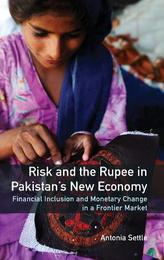
|
Risk and the Rupee in Pakistan's New Economy: Financial Inclusion and Monetary Change in a Frontier Market
Hardback
Main Details
| Title |
Risk and the Rupee in Pakistan's New Economy: Financial Inclusion and Monetary Change in a Frontier Market
|
| Authors and Contributors |
By (author) Antonia Settle
|
| Physical Properties |
| Format:Hardback | | Pages:260 | | Dimensions(mm): Height 235,Width 160 |
|
| Category/Genre | Microeconomics
Development economics
Political economy |
|---|
| ISBN/Barcode |
9781108489935
|
| Classifications | Dewey:332.495491 |
|---|
| Audience | | Professional & Vocational | |
|---|
| Illustrations |
Worked examples or Exercises
|
|
Publishing Details |
| Publisher |
Cambridge University Press
|
| Imprint |
Cambridge University Press
|
| Publication Date |
29 October 2020 |
| Publication Country |
United Kingdom
|
Description
In a world of open markets and global trade, development thinking seeks stability and prosperity for the world's poor by expanding access to financial products. This book challenges the development sector's embrace of 'financial inclusion' by exploring how the new risks and instabilities that accompany the pivot towards the global economy undermining the functioning of money itself. Cast against fundamental change in the monetary environment accompanying the globalisation of markets, the book examines the rapid liberalisation of money and markets in Pakistan. It argues that liberalisation has generated substantive problems not only for the central bank as guardian of national currency, but for ordinary households. By pinpointing how globalisation generates new risks for households in the everyday economy, the book reveals jarring contradictions between free markets and financial inclusion whilst challenging money theory by positing substantive and empirically-grounded monetary contestation that demonstrates a burden of risk imposed on ordinary people, that is only exacerbated by financial inclusion.
Author Biography
Antonia C. Settle teaches at La Trobe University, Melbourne. She is also currently researching on corporate accountability in developing countries at Melbourne University. Prior to holding this position, she worked as a Research Associate at the Sustainable Development Policy Institute in Islamabad, Pakistan.
|